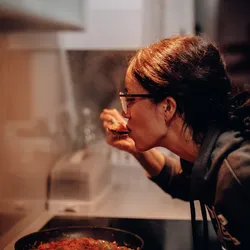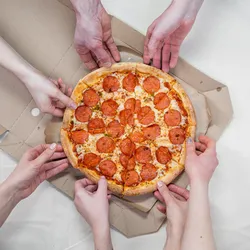
Level 1:
Robots are cooking food in some restaurants. The robots do everything from cutting vegetables to plating dishes. They cook food the same way all the time. Robots work without rest or sick days. Some people worry that robots will take away jobs. But others think robots could create new jobs. Maybe one day, robots will make perfect grilled cheese sandwiches.
Level 2:
Robotic chefs are becoming more common in restaurants. These machines use advanced technology to prepare meals, from chopping vegetables to plating dishes. One of the benefits of using robots is their precision and consistency. They can be programmed to cook food exactly the same way every time. Moreover, they work without needing breaks or taking sick days. However, some people worry that robots will lead to job loss in the restaurant industry. But there may also be opportunities for new roles to be created. In the future, we might even see a robot that can make the perfect grilled cheese sandwich!
Full Story:
In a world where technology continues to shape our daily lives, it comes as no surprise that robots have made their way into the kitchen. Over the past few years, the use of robotic chefs has been steadily increasing, and it’s not hard to see why. These machines are efficient, precise, and can work tirelessly without needing a break.
Picture this: You walk into a restaurant and are greeted by a friendly host who shows you to your table. As you peruse the menu, you notice that there is no mention of any human chefs. Instead, all the dishes are prepared by machines. Not only that, but the kitchen is visible through a glass partition, allowing you to watch the robots in action. It may sound like something out of a sci-fi movie, but it’s actually becoming more and more common. In fact, some restaurants in Japan have already implemented fully automated kitchens, with robots doing everything from chopping vegetables to plating dishes.
One of the main benefits of using robotic chefs is their precision. They can be programmed to cut ingredients to exact measurements and cook them for exactly the right amount of time. This means that each dish is consistent and of high quality, which is especially important for chain restaurants.
Another advantage of using robots in the kitchen is their efficiency. They don’t require breaks or sick days, and can work around the clock if necessary. This means that restaurants can increase their output and serve more customers without needing to hire additional staff.
But what about the human touch, you might ask? Can a robot really replicate the creativity and passion that a human chef brings to a dish? While it’s true that robots may lack the intuition and spontaneity of a human, some companies are working on ways to incorporate these elements into their machines.
For example, Moley Robotics has created a robotic kitchen that can mimic the movements of a human chef. The machine is equipped with cameras that capture the movements of a chef as they prepare a dish. This information is then used to program the robot to replicate those same movements. The result is a machine that can cook just like a human, but with greater precision and efficiency.
Of course, there are also concerns about the impact of robotic chefs on employment in the restaurant industry. While it’s true that some jobs may be lost as a result of automation, there are also opportunities for new roles to be created. For example, someone will still need to oversee the robots and ensure that they are working properly. Additionally, chefs may be able to focus more on recipe development and menu planning, rather than spending all their time in the kitchen.
So what does the future hold for robotic chefs? It’s hard to say for sure, but one thing is certain: the use of automation in the kitchen is only going to increase. Whether it’s fully automated restaurants or machines that assist human chefs, robots are here to stay. And who knows, maybe one day we’ll even have a robot that can make the perfect grilled cheese sandwich.
Questions:
What are some advantages of using robotic chefs in restaurants?
Are there any concerns about the impact of robots on employment in the restaurant industry?
Can robotic chefs replicate the creativity and passion a human chef brings to a dish?
How do companies make sure that their robotic chefs cook food consistently and with high quality?
Do you think the use of robotic chefs will become more or less common in the future? Why or why not? (opinion question)
Fill in the Blanks:
automation, spontaneity, intuition, precision
One of the main benefits of using robotic chefs is their ________.
While it’s true that robots may lack the ________ and ________ of a human, some companies are working on ways to incorporate these elements into their machines.
While it’s true that some jobs may be lost as a result of ________, there are also opportunities for new roles to be created.
Vocabulary:
precision - the quality of being exact and accurate
intuition - the ability to understand something immediately, without the need for conscious reasoning
spontaneity - the quality of being spontaneous, or happening in an unplanned way
automation - the use of machines and technology to perform tasks that would otherwise be done by humans




